- Home
- G. K. Chesterton
What I Saw in America Page 25
What I Saw in America Read online
Page 25
I have already noted the commonplace that in order to teach internationalism we must talk nationalism. We must make the nations as nations less odious or mysterious to each other. We do not make men love each other by describing a monster with a million arms and legs, but by describing the men as men, with their separate and even solitary emotions. As this has a particular application to the emotions of the Englishman, I will return to the topic once more. Now Americans have a power that is the soul and success of democracy, the power of spontaneous social organisation. Their high spirits, their humane ideals are really creative, they abound in unofficial institutions; we might almost say in unofficial officialism. Nobody who has felt the presence of all the leagues and guilds and college clubs will deny that Whitman was national when he said he would build states and cities out of the love of comrades. When all this communal enthusiasm collides with the Englishman, it too often seems literally to leave him cold. They say he is reserved; they possibly think he is rude. And the Englishman, having been taught his own history all wrong, is only too likely to take the criticism as a compliment. He admits that he is reserved because he is stern and strong; or even that he is rude because he is shrewd and candid. But as a fact he is not rude and not especially reserved; at least reserve is not the meaning of his reluctance. The real difference lies, I think, in the fact that American high spirits are not only high but level; that the hilarious American spirit is like a plateau, and the humorous English spirit like a ragged mountain range.
The Englishman is moody; which does not in the least mean that the Englishman is morose. Dickens, as we all feel in reading his books, was boisterously English. Dickens was moody when he wrote Oliver Twist; but he was also moody when he wrote Pickwick. That is, he was in another and much healthier mood. The mood was normal to him in the sense that nine times out of ten he felt and wrote in that humorous and hilarious mood. But he was, if ever there was one, a man of moods; and all the more of a typical Englishman for being a man of moods. But it was because of this, almost entirely, that he had a misunderstanding with America.
In America there are no moods, or there is only one mood. It is the same whether it is called hustle or uplift; whether we regard it as the heroic love of comrades or the last hysteria of the herd instinct. It has been said of the typical English aristocrats of the Government offices that they resemble certain ornamental fountains and play from ten till four; and it is true that an Englishman, even an English aristocrat, is not always inclined to play any more than to work. But American sociability is not like the Trafalgar fountains. It is like Niagara. It never stops, under the silent stars or the rolling storms. There seems always to be the same human heat and pressure behind it; it is like the central heating of hotels as explained in the advertisements and announcements. The temperature can be regulated; but it is not. And it is always rather overpowering for an Englishman, whose mood changes like his own mutable and shifting sky. The English mood is very like the English weather; it is a nuisance and a national necessity.
If any one wishes to understand the quarrel between Dickens and the Americans, let him turn to that chapter in Martin Chuzzlewit, in which young Martin has to receive endless defiles and deputations of total strangers each announced by name and demanding formal salutation. There are several things to be noticed about this incident. To begin with, it did not happen to Martin Chuzzlewit; but it did happen to Charles Dickens. Dickens is incorporating almost without alteration a passage from a diary in the middle of a story; as he did when he included the admirable account of the prison petition of John Dickens as the prison petition of Wilkins Micawber. There is no particular reason why even the gregarious Americans should so throng the portals of a perfectly obscure steerage passenger like young Chuzzlewit. There was every reason why they should throng the portals of the author of Pickwick and Oliver Twist. And no doubt they did. If I may be permitted the aleatory image, you bet they did. Similar troops of sociable human beings have visited much more insignificant English travellers in America, with some of whom I am myself acquainted. I myself have the luck to be a little more stodgy and less sensitive than many of my countrymen; and certainly less sensitive than Dickens. But I know what it was that annoyed him about that unending and unchanging stream of American visitors; it was the unending and unchanging stream of American sociability and high spirits. A people living on such a lofty but level tableland do not understand the ups and downs of the English temperament; the temper of a nation of eccentrics or (as they used to be called) of humorists. There is something very national in the very name of the old play of Every Man in His Humour. But the play more often acted in real life is ‘Every Man Out of His Humour.’ It is true, as Matthew Arnold said, that an Englishman wants to do as he likes; but it is not always true even that he likes what he likes. An Englishman can be friendly and yet not feel friendly. Or he can be friendly and yet not feel hospitable. Or he can feel hospitable and yet not welcome those whom he really loves. He can think, almost with tears of tenderness, about people at a distance who would be bores if they came in at the door.
American sociability sweeps away any such subtlety. It cannot be expected to understand the paradox or perversity of the Englishman, who thus can feel friendly and avoid friends. That is the truth in the suggestion that Dickens was sentimental. It means that he probably felt most sociable when he was solitary. In all these attempts to describe the indescribable, to indicate the real but unconscious differences between the two peoples, I have tried to balance my words without the irrelevant bias of praise and blame. Both characteristics always cut both ways. On one side this comradeship makes possible a certain communal courage, a democratic derision of rich men in high places, that is not easy in our smaller and more stratified society. On the other hand the Englishman has certainly more liberty, if less equality and fraternity. But the richest compensation of the Englishman is not even in the word ‘liberty,’ but rather in the word ‘poetry.’ That humour of escape or seclusion, that genial isolation, that healing of wounded friendship by what Christian Science would call absent treatment, that is the best atmosphere of all for the creation of great poetry; and out of that came ‘bare ruined choirs where late the sweet birds sang’ and ‘Thou wast not made for death, immortal bird.’ In this sense it is indeed true that poetry is emotion remembered in tranquillity; which may be extended to mean affection remembered in loneliness. There is in it a spirit not only of detachment but even of distance; a spirit which does desire, as in the old English rhyme, to be not only over the hills but also far away. In other words, in so far as it is true that the Englishman is an exception to the great truth of Aristotle, it is because he is not so near to Aristotle as he is to Homer. In so far as he is not by nature a political animal, it is because he is a poetical animal. We see it in his relations to the other animals; his quaint and almost illogical love of dogs and horses and dependants whose political rights cannot possibly be defined in logic. Many forms of hunting or fishing are but an excuse for the same thing which the shameless literary man does without any excuse. Sport is speechless poetry. It would be easy for a foreigner, by taking a few liberties with the facts, to make a satire about the sort of silent Shelley who decides ultimately to shoot the skylark. It would be easy to answer these poetic suggestions by saying that he himself might be responsible for ruining the choirs where late the sweet birds sang, or that the immortal bird was likely to be mortal when he was out with his gun. But these international satires are never just; and the real relations of an Englishman and an English bird are far more delicate. It would be equally easy and equally unjust to suggest a similar satire against American democracy; and represent Americans merely as birds of a feather who can do nothing but flock together. But this would leave out the fact that at least it is not the white feather; that democracy is capable of defiance and of death for an idea. Touching the souls of great nations, these criticisms are generally false because they are critical.
But when we are qui
te sure that we rejoice in a nation’s strength, then and not before we are justified in judging its weakness. I am quite sure that I rejoice in any democratic success without arrière pensée; and nobody who knows me will credit me with a covert sneer at civic equality. And this being granted, I do think there is a danger in the gregariousness of American society. The danger of democracy is not anarchy; on the contrary, it is monotony. And it is touching this that all my experience has increased my conviction that a great deal that is called female emancipation has merely been the increase of female convention. Now the males of every community are far too conventional; it was the females who were individual and criticised the conventions of the tribe. If the females become conventional also, there is a danger of individuality being lost. This indeed is not peculiar to America; it is common to the whole modern industrial world, and to everything which substitutes the impersonal atmosphere of the State for the personal atmosphere of the home. But it is emphasised in America by the curious contradiction that Americans do in theory value and even venerate the individual. But individualism is still the foe of individuality. Where men are trying to compete with each other they are trying to copy each other. They become featureless by ‘featuring’ the same part. Personality, in becoming a conscious ideal, becomes a common ideal. In this respect perhaps there is really something to be learnt from the Englishman with his turn or twist in the direction of private life. Those who have travelled in such a fashion as to see all the American hotels and none of the American houses are sometimes driven to the excess of saying that the Americans have no private life. But even if the exaggeration has a hint of truth, we must balance it with the corresponding truth; that the English have no public life. They on their side have still to learn the meaning of the public thing, the republic; and how great are the dangers of cowardice and corruption when the very State itself has become a State secret.
The English are patriotic; but patriotism is the unconscious form of nationalism. It is being national without understanding the meaning of a nation. The Americans are on the whole too self-conscious, kept moving too much in the pace of public life, with all its temptations to superficiality and fashion; too much aware of outside opinion and with too much appetite for outside criticism. But the English are much too unconscious; and would be the better for an increase in many forms of consciousness, including consciousness of sin. But even their sin is ignorance of their real virtue. The most admirable English things are not the things that are most admired by the English, or for which the English admire themselves. They are things now blindly neglected and in daily danger of being destroyed. It is all the worse that they should be destroyed, because there is really nothing like them in the world. That is why I have suggested a note of nationalism rather than patriotism for the English; the power of seeing their nation as a nation and not as the nature of things. We say of some ballad from the Balkans or some peasant costume in the Netherlands that it is unique; but the good things of England really are unique. Our very isolation from continental wars and revolutionary reconstructions have kept them unique. The particular kind of beauty there is in an English village, the particular kind of humour there is in an English public-house, are things that cannot be found in lands where the village is far more simply and equally governed, or where the vine is far more honourably served and praised. Yet we shall not save them by merely sinking into them with the conservative sort of contentment, even if the commercial rapacity of our plutocratic reforms would allow us to do so. We must in a sense get far away from England in order to behold her; we must rise above patriotism in order to be practically patriotic; we must have some sense of more varied and remote things before these vanishing virtues can be seen suddenly for what they are; almost as one might fancy that a man would have to rise to the dizziest heights of the divine understanding before he saw, as from a peak far above a whirlpool, how precious is his perishing soul.
The Future of Democracy
THE TITLE OF THIS final chapter requires an apology. I do not need to be reminded, alas, that the whole book requires an apology. It is written in accordance with a ritual or custom in which I could see no particular harm, and which gives me a very interesting subject, but a custom which it would be not altogether easy to justify in logic. Everybody who goes to America for a short time is expected to write a book; and nearly everybody does. A man who takes a holiday at Trouville or Dieppe is not confronted on his return with the question, ‘When is your book on France going to appear?’ A man who betakes himself to Switzerland for the winter sports is not instantly pinned by the statement, ‘I suppose your History of the Helvetian Republic is coming out this spring?’ Lecturing, at least my kind of lecturing, is not much more serious or meritorious than ski-ing or sea-bathing; and it happens to afford the holiday-maker far less opportunity of seeing the daily life of the people. Of all this I am only too well aware; and my only defence is that I am at least sincere in my enjoyment and appreciation of America, and equally sincere in my interest in its most serious problem, which I think a very serious problem indeed; the problem of democracy in the modern world. Democracy may be a very obvious and facile affair for plutocrats and politicians who only have to use it as a rhetorical term. But democracy is a very serious problem for democrats. I certainly do not apologise for the word democracy; but I do apologise for the word future. I am no Futurist; and any conjectures I make must be taken with the grain of salt which is indeed the salt of the earth; the decent and moderate humility which comes from a belief in free will. That faith is in itself a divine doubt. I do not believe in any of the scientific predictions about mankind; I notice that they always fail to predict any of the purely human developments of men; I also notice that even their successes prove the same truth as their failures; for their successful predictions are not about men but about machines. But there are two things which a man may reasonably do, in stating the probabilities of a problem, which do not involve any claim to be a prophet. The first is to tell the truth, and especially the neglected truth, about the tendencies that have already accumulated in human history; any miscalculation about which must at least mislead us in any case. We cannot be certain of being right about the future; but we can be almost certain of being wrong about the future, if we are wrong about the past. The other thing that he can do is to note what ideas necessarily go together by their own nature; what ideas will triumph together or fall together. Hence it follows that this final chapter must consist of two things. The first is a summary of what has really happened to the idea of democracy in recent times; the second a suggestion of the fundamental doctrine which is necessary for its triumph at any time.
The last hundred years has seen a general decline in the democratic idea. If there be anybody left to whom this historical truth appears a paradox, it is only because during that period nobody has been taught history, least of all the history of ideas. If a sort of intellectual inquisition had been established, for the definition and differentiation of heresies, it would have been found that the original republican orthodoxy had suffered more and more from secessions, schisms, and backslidings. The highest point of democratic idealism and conviction was towards the end of the eighteenth century, when the American Republic was ‘dedicated to the proposition that all men are equal.’ It was then that the largest number of men had the most serious sort of conviction that the political problem could be solved by the vote of peoples instead of the arbitrary power of princes and privileged orders. These men encountered various difficulties and made various compromises in relation to the practical politics of their time; in England they preserved aristocracy; in America they preserved slavery. But though they had more difficulties, they had less doubts. Since their time democracy has been steadily disintegrated by doubts; and these political doubts have been contemporary with and often identical with religious doubts. This fact could be followed over almost the whole field of the modern world; in this place it will be more appropriate to take the great American example of sl
avery. I have found traces in all sorts of intelligent quarters of an extraordinary idea that all the Fathers of the Republic owned black men like beasts of burden because they knew no better, until the light of liberty was revealed to them by John Brown and Mrs. Beecher Stowe. One of the best weekly papers in England said recently that even those who drew up the Declaration of Independence did not include negroes in its generalisation about humanity. This is quite consistent with the current convention, in which we were all brought up; the theory that the heart of humanity broadens in ever larger circles of brotherhood, till we pass from embracing a black man to adoring a black beetle. Unfortunately it is quite inconsistent with the facts of American history. The facts show that, in this problem of the Old South, the eighteenth century was more liberal than the nineteenth century. There was more sympathy for the negro in the school of Jefferson than in the school of Jefferson Davis. Jefferson, in the dark estate of his simple Deism, said the sight of slavery in his country made him tremble, remembering that God is just. His fellow Southerners, after a century of the world’s advance, said that slavery in itself was good, when they did not go farther and say that negroes in themselves were bad. And they were supported in this by the great and growing modern suspicion that nature is unjust. Difficulties seemed inevitably to delay justice, to the mind of Jefferson; but so they did to the mind of Lincoln. But that the slave was human and the servitude inhuman—that was, if anything, clearer to Jefferson than to Lincoln. The fact is that the utter separation and subordination of the black like a beast was a progress; it was a growth of nineteenth-century enlightenment and experiment; a triumph of science over superstition. It was ‘the way the world was going,’ as Matthew Arnold reverentially remarked in some connection; perhaps as part of a definition of God. Anyhow, it was not Jefferson’s definition of God. He fancied, in his far-off patriarchal way, a Father who had made all men brothers; and brutally unbrotherly as was the practice, such democratical Deists never dreamed of denying the theory. It was not until the scientific sophistries began that brotherhood was really disputed. Gobineau, who began most of the modern talk about the superiority and inferiority of racial stocks, was seized upon eagerly by the less generous of the slave-owners and trumpeted as a new truth of science and a new defence of slavery. It was not really until the dawn of Darwinism, when all our social relations began to smell of the monkey-house, that men thought of the barbarian as only a first and the baboon as a second cousin. The full servile philosophy has been a modern and even a recent thing; made in an age whose invisible deity was the Missing Link. The Missing Link was a true metaphor in more ways than one; and most of all in its suggestion of a chain.

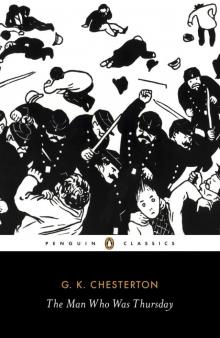 The Man Who Was Thursday: A Nightmare
The Man Who Was Thursday: A Nightmare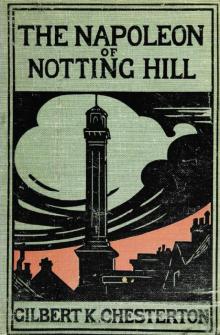 The Napoleon of Notting Hill
The Napoleon of Notting Hill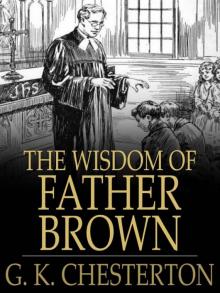 The Wisdom of Father Brown
The Wisdom of Father Brown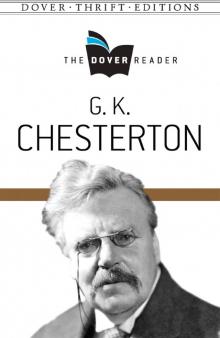 G K Chesterton- The Dover Reader
G K Chesterton- The Dover Reader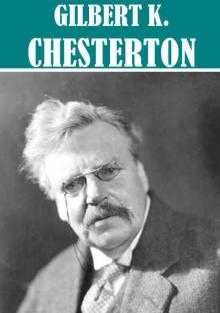 The Essential G. K. Chesterton
The Essential G. K. Chesterton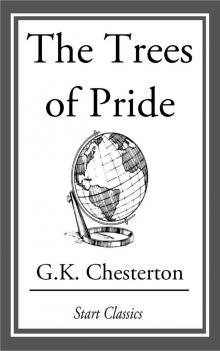 The Trees of Pride
The Trees of Pride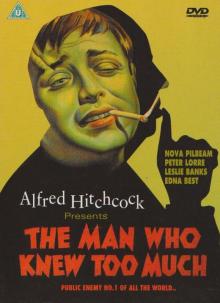 The Man Who Knew Too Much
The Man Who Knew Too Much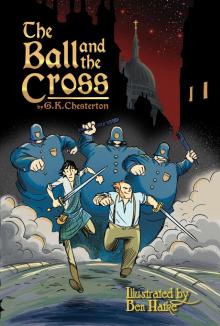 The Ball and the Cross
The Ball and the Cross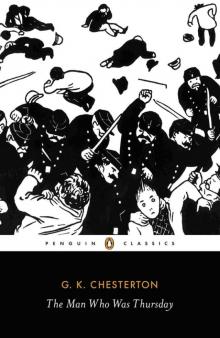 The Man Who Was Thursday (Penguin ed)
The Man Who Was Thursday (Penguin ed)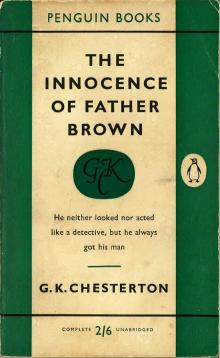 The Innocence of Father Brown
The Innocence of Father Brown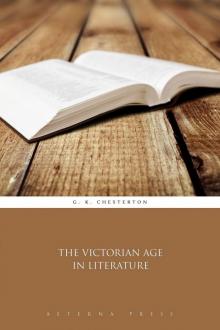 The Victorian Age in Literature
The Victorian Age in Literature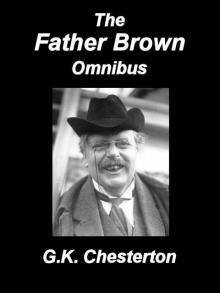 Father Brown Omnibus
Father Brown Omnibus Murder On Christmas Eve
Murder On Christmas Eve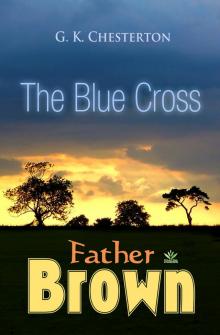 The Blue Cross
The Blue Cross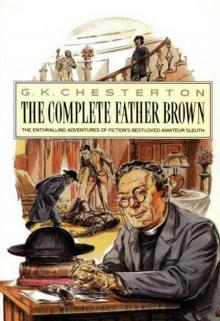 The Complete Father Brown Mysteries Collection
The Complete Father Brown Mysteries Collection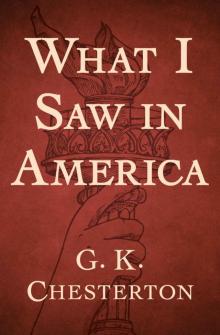 What I Saw in America
What I Saw in America